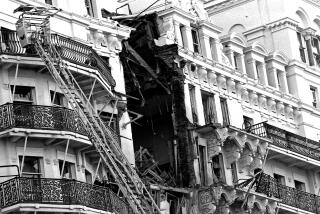Will McVeigh’s Execution Make Him a Martyr?
- Share via
Timothy J. McVeigh, a convicted American terrorist, is scheduled to die tomorrow at the hands of a government he so detested that he killed 168 innocent people simply because they were present in one of its buildings. Few will mourn his passing, even those who, like me, have come to believe that the taking of a human life by the state, even such a twisted life, is a morally flawed practice.
Within a few weeks, a jury in New York is expected to decide whether to impose the death penalty on two foreign terrorists convicted of bombing U.S. embassies in Kenya and Tanzania and killing hundreds of people, mostly Africans. Like McVeigh, these terrorists fervently believe that the government of the United States is an evil force that should be damaged--or ideally destroyed--no matter what the cost to themselves or others.
We need not trouble ourselves over the guilt of these terrorists. Both McVeigh and the embassy bombers were convicted as a result of overwhelming evidence. Nor, at this point, need we worry about the moral problems inherent in capital punishment. That is an argument for another time. It is, however, important that we consider that these crimes are not ordinary murders. They are political assassinations. In these cases, the attacks were directed not against individuals but against the United States government and what it stands for. Those deliberately killed were--to use McVeigh’s chilling phrase--merely ‘collateral damage.”
For this reason we have to ask ourselves whether the major justification usually given for capital punishment--that it deters others from committing similar crimes--really applies. Terrorists do not blow up office buildings in fits of passion. They plan their actions for months with painstaking care. They do not seek personal gain--other than perhaps immortality. For this reason they cannot be deterred by fear of getting caught and suffering the punishment of death. They take pride in their actions. If they are caught and their bravery made public, their glory is all the greater. The grievances that inspired them are trumpeted throughout the world. Even more, their enemies are proven not to be invincible.
They become martyrs. And martyrs, unlike prisoners, achieve a certain kind of immortality. They inspire the faithful to new acts of courage. Their “sacrifices” become legendary among like-minded people, potentially inspiring new atrocities. They take heart from the fact that some who commit terrorist acts, like Che Guevara, have achieved a kind of immortality as a result of their executions at the hands of government officials. Guevara the martyr continues to inspire revolutionaries, whereas Guevara the prisoner would have been largely forgotten.
History and literature abound in tales of those executed by the state who are then elevated by their admirers to the exalted level of martyr. Hardly anyone remembers those who languished, and ultimately died, in prison. Prisoners are not the stuff of legends. This is one reason why the government of Turkey has, at least thus far, refrained from executing Abdullah Ocalan, the captured leader of the militant Kurdish separatist movement who was convicted of treason in 1999 and sentenced to death.
Neither McVeigh nor the embassy bombers merit our sympathy or our mercy. They are murderers and deserve to be punished as such. But we cannot fully control the results of our own actions, however just they may be. Terrorists are sometimes worth more dead than alive to the causes they espouse. This is an irony that will not sway the course of justice, but might temper our satisfaction that, after tomorrow, we will have finally settled the score with Timothy McVeigh.
More to Read
Sign up for Essential California
The most important California stories and recommendations in your inbox every morning.
You may occasionally receive promotional content from the Los Angeles Times.













